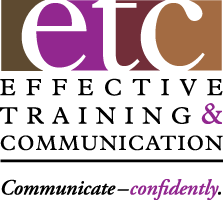I regularly encourage my executive presentation clients to avoid self-introductions whenever they can. The audience is influenced most by what they hear first and if that is the speakers talking about themselves, it can establish the wrong tone.
presentations
Any Questions?
It’s time to add some Best-in-Class strategies for handling audience questions to your growing Workplace Presenter’s Tool Kit. What they ask and how you respond can make or break your credibility, impact your confidence and influence your outcomes.
How much should you practice?
Last month’s ‘Communicate Confidently’ eLetter article on practicing presentations generated several reader questions. Here’s a summary of some of the comments I offered in my email responses:
Start with the End in Mind
Regular readers know that I often write about the importance of Audience Centricity – the single best strategy for getting into the ‘Workplace Presenters’ Hall of Fame’. So, if that’s your goal, the most critical component for creating a Best-in-Class Audience-Centered presentation is … to Start with the End in Mind, as Dr. Stephen Covey teaches us.
Practice Doesn’t Make Perfect!
I hate to trash a childhood fantasy, but Practice doesn’t really make Perfect … it only makes Permanent. Only Perfect Practice makes Perfect. I’ve ranted before about why presenters shouldn’t try to memorize their presentations. They should learn them through practice and refinement of message content and structure. Some thoughts for your consideration:
Presentation Anxiety – the Fear Factor
A recurring theme in my presentation training and executive coaching engagements is dealing with stage fright, the jitters, nervousness or the overall fear of public speaking. Presentation Anxiety (PA) – the clinical term for it – is a perfectly normal human response. But, don’t think you have to overcome it and become more confident and comfortable when presenting. Just appear that way. With the audience, perception is reality.
Slide into Successful Slides
Last time, we discussed how to avoid inflicting ‘Death by PowerPoint’ on your audiences. You should have added a few new or different tools to your Presenter Tool Kit as a result. So, let’s continue the process with a few more suggestions to enable you to Slide Into Successful Slides and maximize your audience-centric results.
Time for a Change?
Regular readers know how much I love ranting about not letting the ‘Tech Tail’ wag the ‘Presenter Dog’, so here’s another example. How do you change those wonderful audience-centric speaker support slides you’ve created when you don’t have a remote available?
Answer – you or someone has to manually change them, but avoid those annoying or clumsy habits that can really reduce the positive impression you project on your audience or the impact of your message. Consider these lessons learned from some of the Varsity Presenters I’ve had the pleasure of coaching:
Can You Hear Me Now?
With most typical workplace presentation situations you’re likely to face, neither the size of the audience nor the size of the room is large enough to need voice amplification. So, simply speak up with your one-to-group energetic volume level and they can hear you fine.
On those rare occasions when you do need a microphone, don’t let the technology tail wag the presenter dog. But do make the most of the technology you have at hand:
Engage Your Eyes
If I only had time to teach my executive coaching clients one delivery skill, it would be to maximize their eye contact. Properly done, engaging your eyes produces several positive results for your audience … and for you. Nothing says more about your credibility, power and confidence than what you do – and don’t do – with your eyes. Everything else is a ‘B’ priority.
